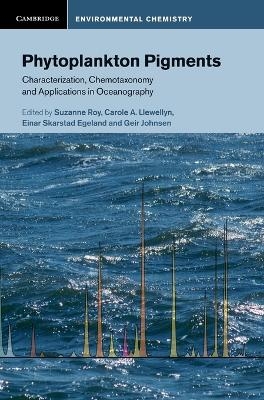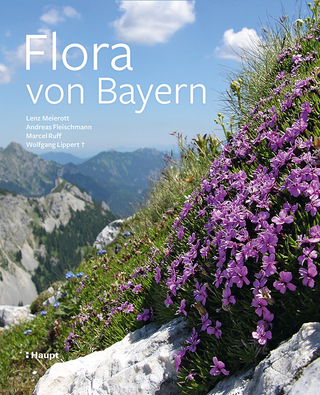
Phytoplankton Pigments
Cambridge University Press (Verlag)
9781107000667 (ISBN)
Pigments act as tracers to elucidate the fate of phytoplankton in the world's oceans and are often associated with important biogeochemical cycles related to carbon dynamics in the oceans. They are increasingly used in in situ and remote-sensing applications, detecting algal biomass and major taxa through changes in water colour. This book is a follow-up to the 1997 volume Phytoplankton Pigments in Oceanography (UNESCO Press). Since then, there have been many advances concerning phytoplankton pigments. This book includes recent discoveries on several new algal classes particularly for the picoplankton, and on new pigments. It also includes many advances in methodologies, including liquid chromatography-mass spectrometry (LC-MS) and developments and updates on the mathematical methods used to exploit pigment information and extract the composition of phytoplankton communities. The book is invaluable primarily as a reference for students, researchers and professionals in aquatic science, biogeochemistry and remote sensing.
Suzanne Roy is a Professor of Biological Oceanography at the Institut des Sciences de la Mer of the Université du Québec à Rimouski (Canada) and a member of Québec-Ocean. Over the last 20 years, Professor Roy has developed an expertise in the ecology and physiology of marine and estuarine phytoplankton, focusing on various aspects such as population dynamics of harmful algae, environmental impacts of aquaculture and ozone-related ultraviolet radiation effects. She also runs an analytical laboratory for the HPLC determination of algal pigments and UV-screening compounds. Her current research interests include the combined influence of climate warming and enhanced UV on phytoplankton communities, photoprotection and cell mortality in Arctic phytoplankton, and the transport of non-indigenous dinoflagellates in ships' ballast tanks. Several of these projects are part of Canada's major NSERC Research Networks such as CAISN and CFL. Professor Roy is a member of the Scientific Committee for the international Global Ecology and Oceanography of Harmful Algal Blooms (GEOHAB) programme. Einar Skarstad Egeland is an Associate Professor in the Faculty of Biosciences and Aquaculture at Bodø University College, Norway. He has a broad experience in organic chemical analysis (chromatography and spectroscopy). He is an internationally recognised scientist on carotenoid analysis from natural sources (mostly prasinophyte algae, but also other algal classes). Currently, he is involved in several cross-disciplinary research projects related to marine ecology, aquaculture and seafood quality. He is an active member of the Marine Ecology Group at Bodø University College. Carole Llewellyn is a microbial biogeochemist at the Plymouth Marine Laboratory, UK. She has experience in phytoplankton pigments and UV absorbing compounds spanning over 20 years. Her research interests are focused on understanding the role of phytoplankton in the ocean and more specifically on microbial and food web dynamics, microbial biodiversity, community composition and photophysiology. At an applied level, her research contributes to eutrophication and pollution studies and links with satellite remote-sensing and bio-optics. More recently she has used her knowledge on algae and pigments to contribute to the rapidly growing area of algal biotechnology. Geir Johnsen is a Professor of Marine Biology at the Norwegian University of Science and Technology (NTNU), and an Adjunct Professor in marine bio-optics at the University Centre in Svalbard (UNIS). His major interests are the use of bio-optical methods in taxonomy, ecology and physiology of micro- and macroalgae. His main focus in the last 20 years has been on photosynthesis, light harvesting and utilization in algae and marine invertebrates with photosynthetic endosymbionts. Current interests include new approaches in in situ and remote sensing techniques for monitoring and mapping of planktonic and benthic organisms in the water surface, water column and sea floor.
List of contributors; Preface; Acknowledgements; List of symbols; Part I. Chlorophylls and Carotenoids: 1. Microalgal classes and their signature pigments S. W. Jeffrey, S. W. Wright and M. Zapata; 2. Recent advances in chlorophyll and bacteriochlorophyll biosynthesis R. J. Porra, U. Oster and H. Scheer; 3. Carotenoid metabolism in phytoplankton M. Lohr; Part II. Methodology Guidance: 4. New HPLC separation techniques J. L. Garrido, R. L. Airs, F. Rodríguez, L. Van Heukelem and M. Zapata; 5. The importance of a quality assurance plan for method validation and minimizing uncertainties in the HPLC analysis of phytoplankton pigments L. Van Heukelem and S. B. Hooker; Appendix: a symbology and vocabulary for an HPLC lexicon S. B. Hooker and L. Van Heukelem; 6. Quantitative interpretation of chemotaxonomic pigment data H. W. Higgins, S. W. Wright and L. Schlüter; 7. Liquid chromatography-mass spectrometry for pigment analysis R. L. Airs and J. L. Garrido; 8. Multivariate analysis of extracted pigments using spectrophotometric and spectrofluorometric methods J. Neveux, J. Seppälä and Y. Dandonneau; Appendix: a proven simultaneous equation assay for chlorophylls a and b using aqueous acetone and similar assays for recalcitrant algae R. J. Porra; Part III. Water-Soluble 'Pigments': 9. Phycobiliproteins K.-H. Zhao, R. J. Porra and H. Scheer; 10. UV-absorbing 'pigments': mycosporine-like amino acids J. I. Carreto, S. Roy, K. Whitehead, C. Llewellyn and M. O. Carignan; Part IV. Selected Pigment Applications in Oceanography: 11. Pigments and photoacclimation processes C. Brunet, G. Johnsen, J. Lavaud and S. Roy; 12. Pigment-based measurements of phytoplankton rates A. Guttierez-Rodriguez and M. Latasa; 13. In vivo bio-optical properties of phytoplankton pigments G. Johnsen, A. Bricaud, N. Nelson, B. B. Prézelin and R. R. Bidigare; 14. Optical monitoring of phytoplankton bloom pigment signatures G. Johnsen, M. A. Moline, L. H. Pettersson, J. L. Pinckney, D. V. Pozdnyakov, E. S. Egeland and O. M. Schofield; Appendix: harmful algae toxins and pigments E. S. Egeland; Part V. Future Perspectives: 15. Perspectives on future directions C. Llewellyn, S. Roy, G. Johnsen, E. S. Egeland, M. Chauton, G. Hallegraeff, M. Lohr, U. Oster, R. J. Porra, H. Scheer and K.-H. Zhao; Part VI. Aids for Practical Laboratory Work: Appendix A. Update on filtration, storage and extraction solvents J. L. Pinckney, D. F. Millie and L. Van Heukelem; Appendix B. The pigment analyst's guide to HPLC hardware A. R. Neeley, C. S. Thomas, S. B. Hooker and L. Van Heukelem; Appendix C. Minimum identification criteria for identifying phytoplankton pigments E. S. Egeland; Appendix D. Phytoplankton cultures for standard pigments and their suppliers S. Roy, S. W. Wright and S. W. Jeffrey; Appendix E. Commercial suppliers of phytoplankton pigments E. S. Egeland and L. Schlüter; Part VII. Phytoplankton Pigments Data Sheets E. S. Egeland; Index.
| Reihe/Serie | Cambridge Environmental Chemistry Series |
|---|---|
| Zusatzinfo | 61 Tables, black and white; 17 Plates, color; 27 Halftones, black and white; 47 Line drawings, black and white |
| Verlagsort | Cambridge |
| Sprache | englisch |
| Maße | 180 x 254 mm |
| Gewicht | 1692 g |
| Themenwelt | Naturwissenschaften ► Biologie ► Botanik |
| Naturwissenschaften ► Biologie ► Limnologie / Meeresbiologie | |
| Naturwissenschaften ► Geowissenschaften ► Geologie | |
| Naturwissenschaften ► Geowissenschaften ► Hydrologie / Ozeanografie | |
| ISBN-13 | 9781107000667 / 9781107000667 |
| Zustand | Neuware |
| Informationen gemäß Produktsicherheitsverordnung (GPSR) | |
| Haben Sie eine Frage zum Produkt? |
aus dem Bereich


